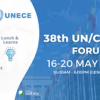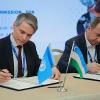News
Displaying Results 26 - 50 of 289
World trade continues to be severely affected by global supply chain disruptions, exacerbated by shocks including the ongoing Covid-19 pandemic and the war in Ukraine. These challenges attest to the value of supporting and reinforcing trade facilitation measures to enhance resilience in all regions…
In the past few years, multiple shocks ranging from pandemics to conflicts have restricted the movement of goods and services, resulting in the number of countries facing significant disruptions in supply chains is increasing every year, affecting timely delivery of essential goods, such as food…
In June 2022, the World Trade Organization (WTO) Members agreed on the Ministerial Outcome Document, which marked for the first time the recognition of the importance of the multilateral trading system in addressing the triple global environmental crises of climate change and related natural…
With blockchain opening up many avenues in international trade – from facilitating financing and customs procedures to tracking due diligence and sustainability compliance – countries and companies are looking for successful practices to scale up their efforts to maximize the potential of this new…
July is a month to start enjoying the harvest of fruits and vegetables for many in Europe and the topic of reducing food loss and waste becomes very urgent. In Serbia, agriculture is an important sector of the economy, contributing around 6% of GDP. In March 2022 food production accounted for 10.4…
In view of the upcoming COP 27 of the UNFCCC, taking place in Egypt later this year, the growing threats on climate created by the textile and leather sectors call for our urgent action. If we continue down this path, we will fail by 50% to meet our 2030 emissions reduction targets, resulting in…
The third online meeting on the new Master Plan for Kharkiv on 28 May 2022 saw a group of local architects join the discussions led by the Norman Foster Foundation and the City Government of Kharkiv. Mayor of Kharkiv Ihor Terekhov spoke of his vision to transform the city to become a great…
UNECE was engaged at the main global forum to assess and discuss progress in implementing the Sendai Framework for Disaster Risk Reduction (DRR) – the seventh session of the Global Platform for Disaster Risk Reduction (GP2022) held in Bali and online, 25-27 May 2022, fully embracing its theme: “…
Recent disruptions of supply chains have exposed fragilities in the current trading system and brought to light the importance of resilience and transparency in global trade.
UNECE and other international organizations play a crucial role in supporting countries (including both the public and…
The textile industry is a key driver of Uzbekistan’s economy, reflected in the country’s rank as sixth largest cotton producer in the world. In 2021, the country accelerated the battle against its child and forced labor violations in cotton harvest according to a new International Labour…
New multilateralism, focused on creating synergies between local, national, regional and global efforts, combined with practical, forward-looking solutions are needed to address the pressing challenges facing cities across the globe, including the coronavirus pandemic, rapid urbanization, and…
As supply chains within the garment and footwear sector are becoming increasingly complex, the need for transparency is more relevant than ever. Consumers, investors and shareholders are pressing for transparent business activities as well as the prevention and mitigation of risks in value chains,…
Global trade has been transformed repeatedly throughout history, driven by new business processes and new policies. The new advances in digitalization now promise further transformation by making it faster, more transparent, reducing risks of red tape and corruption. With the increase in global…
Over 60 participants worldwide joined the online roundtable organized by the UN Digital transformation group for Europe and Central Asia (DTG4ECA) in the framework of the Regional Forum on Sustainable Development for the UNECE region. Established in May 2020, DTG4ECA group, co-chaired by UNECE and…
Cities have the power to accelerate the achievement of the 2030 Agenda Sustainable Development Goals (SDGs) through their work at the local level. Examples of this will be presented and discussed at the H22 +50 Session (31 May 2022), and Dialogue of Eminent Experts on smart, sustainable, and…
Strengthening value chains between Africa and the European Union (EU) is a priority objective for sustainable growth and decent jobs across the two continents. Recent market imbalances and disparities, involving supply chain disruptions and lack of attention to the social and environmental impacts…
The global economy enters 2022 with new challenges. Almost two years into the Covid-19 pandemic the digitalization of transport and trade data flows is on top of the economic agenda. In response, UNECE organized its 4th workshop on trade facilitation, Single Window, and data sharing for the Western…
Trade facilitation is a key priority for Kyrgyzstan and its trading community for participation in the global and regional trading system. Under the project on “Strengthening the capacity of the Kyrgyzstan National Trade Facilitation Council to implement the WTO Trade Facilitation Agreement”, UNECE…
Complex global value chains include production facilities scattered all over the world. Sometimes, they may also involve practices of illegitimate subcontracting and undeclared informal work. In fact, their complexity and opacity make it very hard to gain accurate information about how and where…
COP26 was a positive step forward in the fight against climate change, but as the UN Secretary General pointed out in his comments: “it is not enough. We must accelerate climate action to keep alive the goal of limiting the global temperature rise to 1.5 degrees.” The compromise deal reflects the…
As all eyes turn to Glasgow where world leaders have gathered at COP26 for crucial negotiations to cut greenhouse gas (GHG) emissions and limit global warming, UNECE experts highlight how improved transparency and traceability could be part of the solution. The private sector has a vital role to…
The Group of 7 nations (G7), six of which are UNECE member States (Canada, France, Germany, Italy, the UK and the US), took bold step towards reducing barriers to trade by agreeing on the principles to govern cross-border data use and digital trade. At their meeting in London on 22 October,…
The COVID-19 pandemic restrictions have brought the benefits of paperless trading to the forefront of attention. Many countries are considering issuing, accepting and exchanging electronic documents for paperless trading. Issues related to paperless trading are also at the core of World Trade…
An exhibition of urban sketches by Architect Norman Foster is opening today at the Palais des Nations on the occasion of the UNECE Ministerial Meeting on Urban Development, Housing and Land Management (6-8 October). The sketches present visions of city planning that incorporate concepts of…
The need to digitalize information flows in international supply chains became clearer than ever during the pandemic, thanks to the reduced person-to-person contact this allows, on top of important efficiency gains. However, efforts to date have been fragmented. UNECE and its subsidiary body UN/…


























